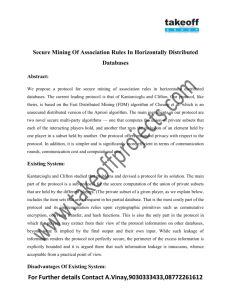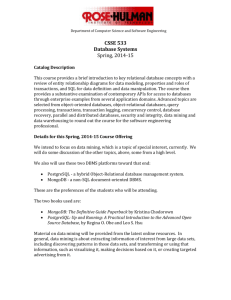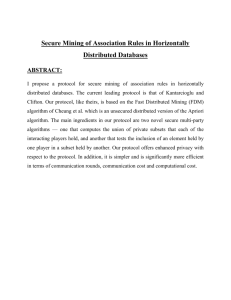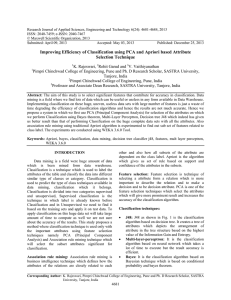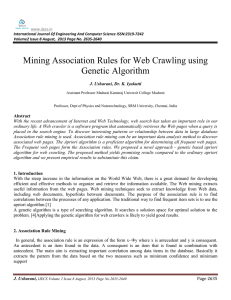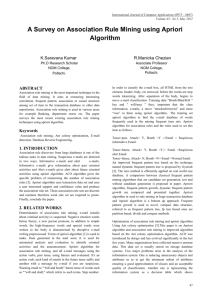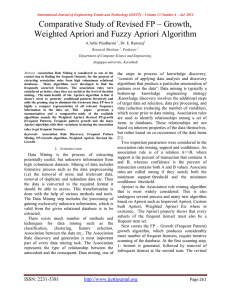The FDM algorithm proceeds as follows
advertisement
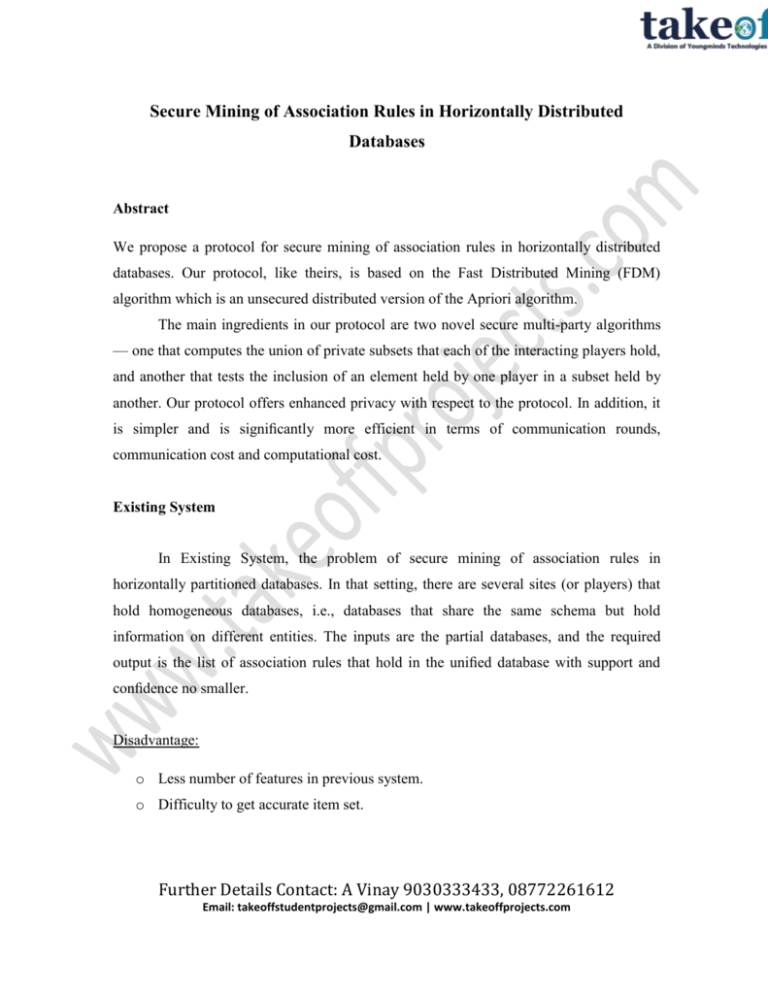
Secure Mining of Association Rules in Horizontally Distributed Databases Abstract We propose a protocol for secure mining of association rules in horizontally distributed databases. Our protocol, like theirs, is based on the Fast Distributed Mining (FDM) algorithm which is an unsecured distributed version of the Apriori algorithm. The main ingredients in our protocol are two novel secure multi-party algorithms — one that computes the union of private subsets that each of the interacting players hold, and another that tests the inclusion of an element held by one player in a subset held by another. Our protocol offers enhanced privacy with respect to the protocol. In addition, it is simpler and is significantly more efficient in terms of communication rounds, communication cost and computational cost. Existing System In Existing System, the problem of secure mining of association rules in horizontally partitioned databases. In that setting, there are several sites (or players) that hold homogeneous databases, i.e., databases that share the same schema but hold information on different entities. The inputs are the partial databases, and the required output is the list of association rules that hold in the unified database with support and confidence no smaller. Disadvantage: o Less number of features in previous system. o Difficulty to get accurate item set. Further Details Contact: A Vinay 9030333433, 08772261612 Email: takeoffstudentprojects@gmail.com | www.takeoffprojects.com Proposed System In Proposed System, propose an alternative protocol for the secure computation of the union of private subsets. The proposed protocol improves upon that in terms of simplicity and efficiency as well as privacy. In particular, our protocol does not depend on commutative encryption and oblivious transfer (what simplifies it significantly and contributes towards much reduced communication and computational costs). While our solution is still not perfectly secure, it leaks excess information only to a small number (three) of possible coalitions, unlike the protocol of that discloses information also to some single players. In addition, we claim that the excess information that our protocol may leak is less sensitive than the excess information leaked by the protocol. Advantage: 1) As a rising subject, data mining is playing an increasingly important role in the decision support activity of every walk of life. 2) Get Efficient Item set result based on the customer request. Modules 1. User Module. 2. Admin Module. 3. Association Rule. 4. Apriori Algorithm. Further Details Contact: A Vinay 9030333433, 08772261612 Email: takeoffstudentprojects@gmail.com | www.takeoffprojects.com Modules Description User Module In this module, privacy preserving data mining has considered two related settings. One, in which the data owner and the data miner are two different entities, and another, in which the data is distributed among several parties who aim to jointly perform data mining on the unified corpus of data that they hold. In the first setting, the goal is to protect the data records from the data miner. Hence, the data owner aims at anonymizing the data prior to its release. The main approach in this context is to apply data perturbation. He perturbed data can be used to infer general trends in the data, without revealing original record information. In the second setting, the goal is to perform data mining while protecting the data records of each of the data owners from the other data owners. Admin Module In this module, is used to view user details. Admin to view the item set based on the user processing details using association role with Apriori algorithm. Association Rule: Association rules are if/then statements that help uncover relationships between seemingly unrelated data in a relational database or other information repository. An example of an association rule would be "If a customer buys a dozen eggs, he is 80% likely to also purchase milk." Association rules are created by analyzing data for frequent if/then patterns and using the criteria support and confidence to identify the most important relationships. Support is an indication of how frequently the items appear in the database. Confidence indicates the number of times the if/then statements have been found to be true. Apriori Algorithm: Further Details Contact: A Vinay 9030333433, 08772261612 Email: takeoffstudentprojects@gmail.com | www.takeoffprojects.com Apriori is designed to operate on databases containing transactions. The purpose of the Apriori Algorithm is to find associations between different sets of data. It is sometimes referred to as "Market Basket Analysis". Each set of data has a number of items and is called a transaction. The output of Apriori is sets of rules that tell us how often items are contained in sets of data. Algorithm - Fast Distributed Mining (FDM) The FDM algorithm proceeds as follows: (1) Initialization (2) Candidate Sets Generation (3) Local Pruning (4) Unifying the candidate item sets (5) Computing local supports (6) Broadcast Mining Results SYSTEM SPECIFICATION Hardware Requirements: • • • • • • • System Hard Disk Floppy Drive Monitor Mouse Ram Keyboard : : : : : : : Pentium IV 2.4 GHz. 40 GB. 1.44 Mb. 14’ Colour Monitor. Optical Mouse. 512 Mb. 101 Keyboards. Software Requirements: • • • • Operating system Front End Coding Language Data Base : Windows 7 Ultimate (32-bit) : VS2010 : ASP.Net with C# : SQL Server 2008 Further Details Contact: A Vinay 9030333433, 08772261612 Email: takeoffstudentprojects@gmail.com | www.takeoffprojects.com

